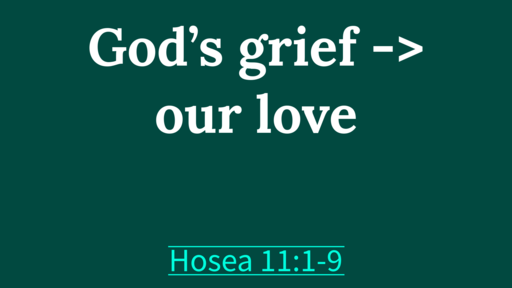God's grief -> our love

God’s grief
God’s love
Theology of the Atonement
The various theories of Christ’s atonement describe God’s purposes in Christ’s death and lead to further inquiry about the efficacy of the cross, especially the extent of its benefits and recipients.
The Ransom Theory. In this view, the atonement was payment made by God to Satan, because Satan held mankind in bondage to sin and death. Origen in particular argued that the cross was a ransom payment equal in value to man’s sin debt, a debt accrued since Adam’s original sin.
The Satisfaction Theory. This view of the atonement, sometimes called the “Latin view,” was primarily developed by Saint Anselm in Cur Deus Homo (Why God Became Man). This view sets God’s justice or honor against man’s immense sin debt. The satisfaction view is a reaction against the ransom view. Anselm argued that it was not to Satan but to God that man’s sin debt was owed.
Christus Victor. This view of the atonement argues—in the words of its best-known promoter, Gustav Aulén—that “the work of Christ is first and foremost a victory over the powers which hold mankind in bondage: sin, death, and the devil” (Christus Victor, p. 20). This view is a reaction to both the ransom and the satisfaction theories. Instead of payment to Satan or to God, the death of Christ is seen as a conquest in a cosmic conflict.
The Solidarity Theory. This view argues that Christ at the cross identified with humanity’s suffering and overcame it. In doing so, he brought humanity into a new way of living according to divine justice. While considered newer, this view has roots within other, older views. This view most resembles Christus Victor, and N. T. Wright and the others who adopt the New Perspective on Paul have been this view’s most influential proponents. Jürgen Moltmann and his “suffering of God” theology, too, provide a variation on the solidarity theory.
Penal Substitution. This view is often associated with the magisterial reformers Martin Luther and John Calvin. Some studies have demonstrated, however, that key elements of the penal substitution theory are evident in the early years of church history. The word “penal” refers to the divine penalty enacted at the cross. This penalty is more than payment for sin to God (though it is that); it is also the site at which God expended his wrath against human sin. God can be just and the justifier of the ungodly because Christ was our substitute on the cross: he paid sin’s penalty. By his sacrificial death he “cancel[ed] the record of debt that stood against us with its legal demands” (Col 2:14). Our sin, in this view, is imputed to Christ, and his righteousness is imputed to us.
Universalism. Universalists believe that all mankind will be saved. The extent of the atonement is unlimited: even lack of faith is no constraint on the power of Christ’s atonement, and complete reconciliation with God is the destiny of all men.
General atonement. In this view, the atonement is for the whole world: Christ’s atonement makes salvation possible for all. That atonement is effective for an individual when God sees his or her faith in advance.
Limited atonement. This view teaches that Christ’s atonement was effectual only for the elect. It is sometimes called “definite atonement” or “particular redemption”—not in order to place the emphasis on who is excluded, but to emphasize what Christ accomplished on the cross. This is closely associated with Calvinism
Hypothetical Universalism. This view is a moderate Calvinist view of the atonement. The difference between this view and the standard limited-atonement view of five-point Calvinism is that it sees the cross as actually sufficient for all men, since its payment is infinite. At the same time, the cross is also particular in its efficacy to the elect.
Luther
It is rather difficult to pin Luther down to any of these views, however, since he uses terminology which suggests sometimes one, sometimes another idea. Some would say this indicates an inconsistency in his thinking. Perhaps. It would be foolish to expect of him a consistency which comes to a theology only after long centuries of reflection. On the other hand, our puzzlement over what he meant may result in part at least from our own lack of understanding, our attempts to force on him an either/or which does him an injustice. It might be that he had a view of the atonement large enough to hold together what we have let fall apart.
Our grief
Our love
it is apparent that there is no real difference between so called “different pictures” or “theories” of the atonement. Jesus “satisfied the wrath of God”, or “bears the curse of the law,” or “suffers the punishment” at the same time as he “wins the victory” over the demons and death. It is all of a piece. Indeed, since his life, death, and resurrection are ours, it is quite possible also to speak of him as our “example.” All the views come together and the language is virtually interchangeable as long as we are talking about a theology of the cross not merely about the cross. What is ruled out is only that kind of thinking that detracts from the real down to earth death of Jesus by translating it into a theory about something that took place in heaven.
